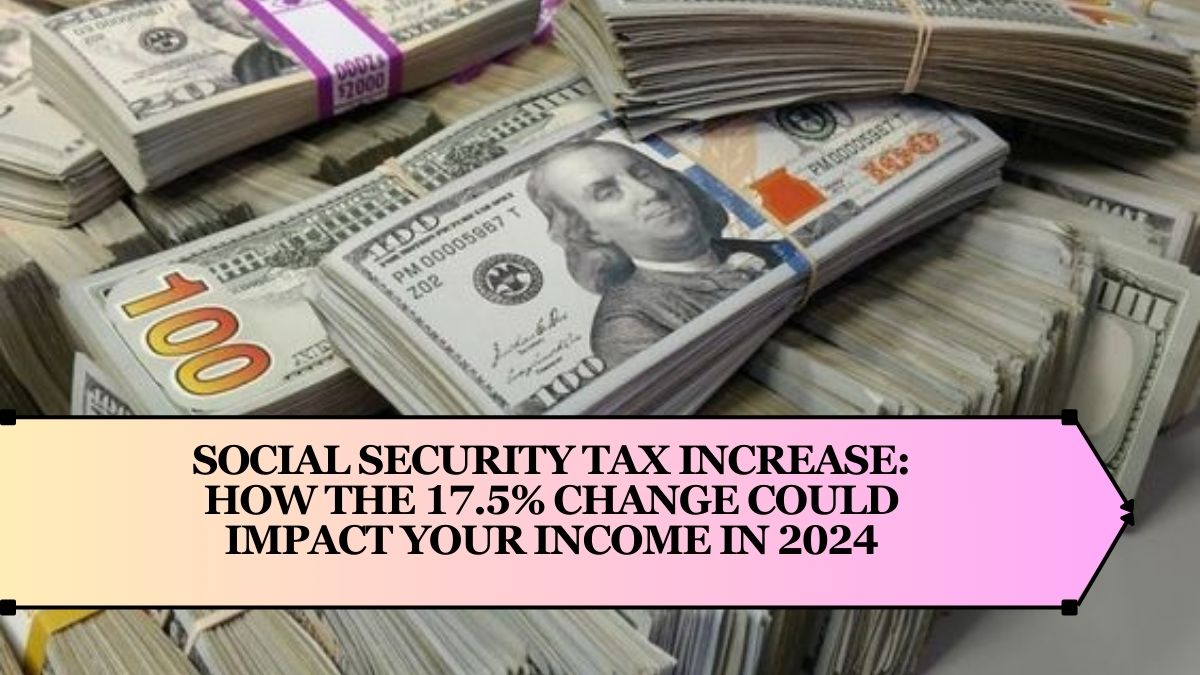Social Security is an important program that provides benefits for retirees, disabled individuals, and the families of workers who have passed away. But recently, there has been talk of a possible increase in Social Security taxes, which could rise to 17.5% in 2024. This has raised concerns for many people about how it might affect their finances. In this article, we’ll break down what this potential change means, why it’s being discussed, and what impact it might have on you.
What is the Current Social Security Tax Rate?
At present, the Social Security tax rate is 12.4%. This tax is split between employees and employers, with each paying 6.2%. However, if you are self-employed, you pay the full 12.4% because you are both the employee and the employer. The tax is applied to income up to a certain limit, which changes every year.
Social Security Tax for 2023 and 2024
Here is a quick look at the tax rate and income cap for Social Security for the years 2023 and 2024:
| Tax Rate | Income Cap (2023) | Income Cap (2024) |
|---|---|---|
| 12.4% | $160,200 | $168,600 |
In 2024, the income cap will rise to $168,600, meaning that more income will be subject to the 12.4% tax. This is an increase from the 2023 limit of $160,200.
Is There Really an Increase to 17.5%?
There is currently no official decision to raise the Social Security tax rate to 17.5% in 2024. However, reports and financial experts have suggested that this could be a possibility in the future. The reason for this is the need to address potential shortages in the Social Security Trust Fund, which funds benefits for retirees and other beneficiaries.
Why is This Tax Increase Being Discussed?
There are several reasons why the possibility of a tax increase is being discussed. These include:
- Aging Population: As more people reach retirement age, the number of beneficiaries receiving Social Security payments is growing. Meanwhile, the number of workers contributing to the system is shrinking.
- Longer Life Expectancy: People are living longer, which means that Social Security needs to pay benefits for longer periods of time.
- Cost-of-Living Adjustments (COLA): Social Security benefits are adjusted every year to keep up with inflation. For 2024, there is a 3.2% increase in Social Security payments, but this also adds to the system’s costs.
- Revenue Shortfalls: If the Social Security Trust Fund runs low on money in the future, an increase in taxes may be necessary to keep the system running smoothly.
Who Pays the Social Security Tax?
Both employees and employers pay Social Security tax, but self-employed individuals have to pay the entire 12.4% themselves. Here’s a breakdown of how much people pay:
| Category | Contribution Rate | Annual Amount (Based on $160,200 cap) |
|---|---|---|
| Employee | 6.2% | $9,932.40 |
| Employer | 6.2% | $9,932.40 |
| Self-Employed | 12.4% | $19,864.80 |
How Would a 17.5% Tax Rate Impact Your Paycheck?
If the Social Security tax rate were raised to 17.5%, it would mean higher taxes for both employees and employers. Here’s a look at how this could affect different income levels:
| Income Level | Current Tax (12.4%) | Proposed Tax (17.5%) | Increase |
|---|---|---|---|
| $50,000 | $6,200 | $8,750 | +$2,550 |
| $100,000 | $12,400 | $17,500 | +$5,100 |
| $168,600 | $20,896.80 | $29,505 | +$8,608.20 |
As you can see, for someone earning $50,000, the tax increase could add an extra $2,550 per year. For someone earning the income cap of $168,600, the increase could be as much as $8,608.20. This would mean people would take home less money and may need to adjust their spending and savings habits.
Is This Information Reliable?
It’s important to note that while reports about the possible tax hike to 17.5% are circulating, no official decision has been made yet. The information comes from financial projections and concerns about the long-term funding of Social Security. To get the most accurate and up-to-date information, it’s best to refer to official announcements from the Social Security Administration (SSA) or talk to a trusted financial advisor.
Preparing for Potential Changes
Although there is no guarantee that the Social Security tax will increase in 2024, the possibility has been discussed. It’s important to stay informed about these changes and plan accordingly for your financial future. This includes considering how tax hikes could affect your retirement savings and budgeting. Keeping an eye on the updates from the SSA will help you make adjustments if needed.
Conclusion
While the increase in the Social Security tax to 17.5% in 2024 is not confirmed, the discussion is ongoing. Factors like the aging population and rising life expectancy are putting pressure on the Social Security system, and changes may be necessary to keep it funded. As an employee, self-employed person, or employer, it’s important to be aware of these potential changes and prepare your finances accordingly. Keep an eye on future announcements to understand how these changes may impact your personal financial situation.
FAQs
1. What is the current Social Security tax rate?
The current Social Security tax rate is 12.4%. This tax is split evenly between employees and employers, with each paying 6.2%. Self-employed individuals pay the full 12.4% themselves.
2. Is the Social Security tax really increasing to 17.5% in 2024?
At this moment, there is no official plan to raise the Social Security tax to 17.5% in 2024.
3. Why is there talk of increasing the Social Security tax?
The increase in tax discussions is due to several factors, including an aging population, increased life expectancy.
4. Who will be affected if the Social Security tax rises to 17.5%?
If the tax were increased to 17.5%, both employees and employers would pay more.

